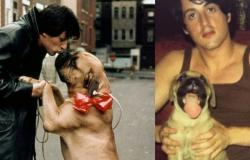Miqui Puig (L’Ametlla del Vallès, 1968) is a border Collie, hyperactive, always restless, in constant movement, such as Pancho, the beautiful Pastora dog that every morning, at untimely hours, will look for it to bed to take it for a walk. singer, producer, DJ, manager, television presenter, radio announcer, editor of cultured musical magazines … now adds a new experience to his very extensive career with the publication of I did not want to be Miqui Puig (Magazzini Salani, 2025), although who was the leader of The singles He emphasizes that the writing of this particular autobiography has been much more than adding a new chapter to his artistic career. The work, written from newspapers that accumulate since 1992it is not only a compilation of personal memories, but also a kind of Emotional Exorcism. “It’s what has ever done me the most,” explains the author of Nice is and other pop love songs that are an indissoluble part of our vital soundtrack. “But this is gone,” he says. The book is, above all, an honest and serene immersion in his life, an intimate portrait and, at the same time, a generational testimony.
I did not want to be Miqui Puig It is, above all, an honest and serene immersion in his life, an intimate portrait and, at the same time, a generational testimony
Miqui Puig wanted to flee deliberately from the usual style of musical memoirs. “I didn’t want to make a rock book,” he insists. “I wanted to do a literary exercise.” And he has succeeded: one of the great virtues of the work is his tune prose. Inspired by works such as Patient – The True story of a Rare Illnessby Ben Watt. “Many people asked me: will there be many strips? And no, I don’t feel like cracking.”
A key part of the book is the newspaper tickets, small pills that open each chapter (each focused on one of the aspects that have marked the artist’s personality: love, death, fashion …) and that reveal the evolution of An artist who, over the years, has learned to live with his insecurities and contradictions. “I have written every day since 92. when I get up, I feel breakfast, write … Sometimes it is trivial, sometimes there are cool things, sometimes there are reflections,” he explains. This habit has been fundamental to shape the book, but also to keep your creative need alive. The writing process, however, has not been easy. During the pandemic, he was about to throw his newspapers. Far from getting rid of them, he recovered them by discovering in them a (pleasant) threat: “This will hurt me, one day I will hurt myself with this …”, he repeated. And, indeed, the damage came in the form of confrontation with the past, with the errors, with the decisions taken. In the same way, I did not want to be Miqui Puig He does not seek to make peace with anything or anyone, but he offers a kind of catharsis, a release. “Making peace, no … but writing the book, has calmed me. It has removed a lot, but it has calmed me.”
Personal portrait, generational radiography
Miqui Puig is claimed as a maverickun outsidersomeone who has never finished fitting in the Catalan and Spanish music industry. Both in his artistic career and in the book, he shows this disagreement with honesty and with a lucidity that distinguishes him. “It is a bit like the discomfort of Miqui Puig, he is a character who is there, but that bothers everyone, because you don’t know where to locate it.” In the same way he admits that he has taken to write the book because he needed to find the right time: “He has arrived at a good time. I wanted. I had it clear.” I did not want to be Miqui Puig It arrives at a time of vital and artistic maturity, in which Puig feels more safely to look back and put order in chaos. “The older we do, it is when we are better.”
Miqui Puig has turned his vulnerability into literature, his memory into a document, and his unleashing in a clear voice, which oozes dignity and passion
The book is also, inevitably, A story of sentimental and sexual education. Puig does not dodge uncomfortable themes of his generation: “We were misogynist because they had not taught us anything else. We were fearful. We didn’t know how to love otherwise. The singer exposes how his environment and emotional training have been marked by decades of social, political and cultural changes lived especially from Barcelona, a city that occupies a central place in his memory and in the book. Although the book is deeply personal, Puig also finds a collective value: “All personal portrait is a generational radiography. And perhaps for that, his testimony resonates with very diverse people, even with those with whom he has no direct link: “I am getting very diverse Peña feedback, people who did not expect me …” With I did not want to be Miqui Puigthe artist has taken a brave step. He has turned his vulnerability into literature, his memory into a document, and his unleashing in a clear voice, which oozes dignity and passion. A book that does not seek to like, but explain.






